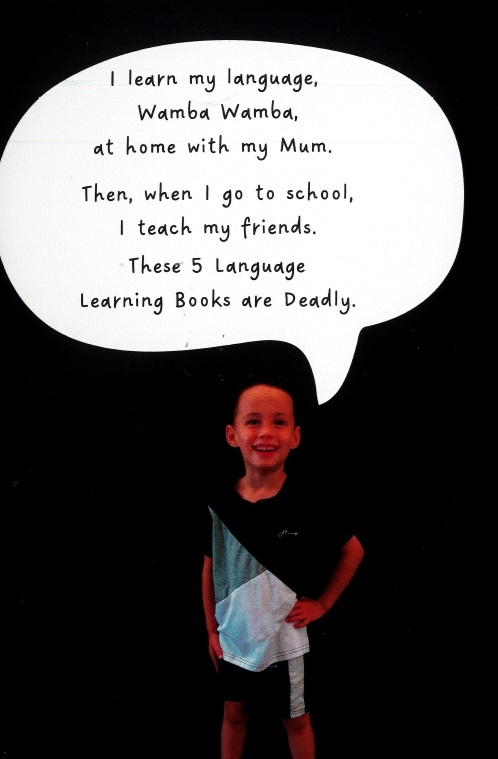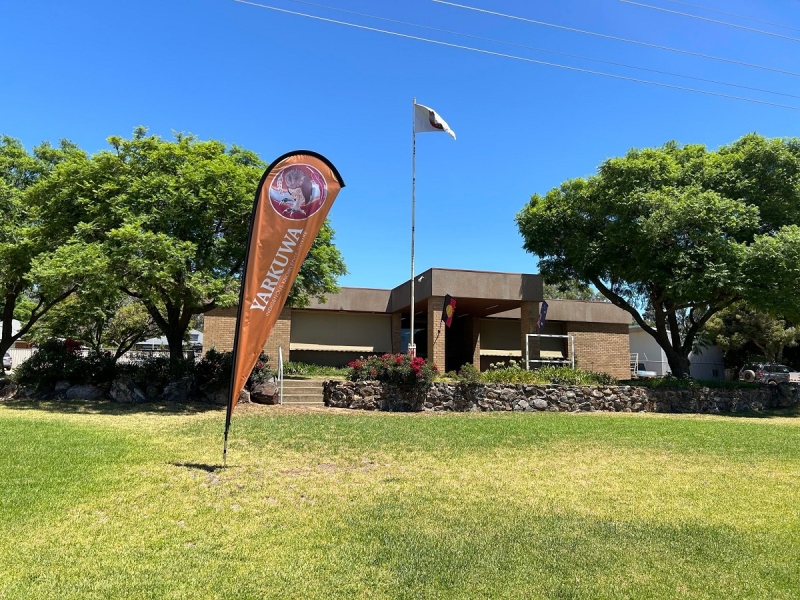Partnerships for knowledge-keeping
Family and community are always welcome at Yarkuwa Indigenous Knowledge Centre. It’s an open space where visitors drop in to view exhibitions and talk to staff. Staff and community members bring children to play and be involved.
It’s a place for sharing knowledge, connecting between generations and forming partnerships with people who aim for better outcomes in Deniliquin, NSW.
Two decades after incorporating, the centre has grown. They’ve gone from a small office with 3 staff in Deniliquin to their permanent home on Hay Road with 21 staff, and programs crossing culture, heritage, arts, social wellbeing and environment.
The team has taken a partnership approach to supporting the local community since the start. It began with 3 people who shared a vision: to do something about health, housing and education for local people. Today they’re influencing state legislation and partnering with service delivery organisations to have a bigger, longer and more positive impact in the community.
Research and return of materials builds skills and identity
Yarkuwa (which means ‘to look for and search over long distances’) was set up in 2003 by the local community with Jeanette Crew OAM, a Mutthi Mutthi Elder skilled in land and resource management elected as chairperson – a position she still holds today. David Crew worked alongside the community through the development stages and started as manager in 2007. The registration of Yarkuwa was the result of a community development project supported by NSW TAFE bringing together information about local history and identity.
‘There was a lack of knowledge about how people were connected and a view that people had come in from lots of different places to settle here,’ says Jeanette.
‘So we did a research project where we went through archives, such as the Australian Institute of Aboriginal and Torres Strait Islander Studies, and brought copies back to Deniliquin.’
With these materials in community, Jeanette says it was a chance to build research skills, and an opportunity to partner with TAFE and provide formal training.
‘We used this as a basis for teaching research and analytical skills to members of the community,’ Jeanette says.
‘TAFE had come to the end of the community courses they could teach and they were looking for something new. The course taught people how to do their family tree, do the research, what to do with the information when they got it, how to look at it and assess what it was trying to tell them, and how to cross-reference it.’
It turned out 80% of people were connected to Deniliquin. Photos and recordings of past generations were brought back to Deniliquin to find family and belonging. This built strength in identity for members of the community and created an exhibition that is still attracting visitors today.
Informing projects from the ground up
Since this first project, Yarkuwa has become a central hub of cultural and local knowledge. Other organisations and government agencies come to them for expert local knowledge to inform projects. Yarkuwa connects them with local knowledge holders. They collaborate on and inform more appropriate programs for the community so they can achieve their vision for better health, employment and education.
Yarkuwa’s partnerships included the Local Drug Action Team (LDAT) with the Commonwealth Alcohol and Drug Foundation. The LDAT has achieved education forums and a locally appropriate awareness campaign targeting the dangers of drinking and fishing. It provided education and consultation sessions for local community members.
Yarkuwa also preserves language and culture, including building the Wurrekangurr language database and publishing the first book ever in Wamba Wamba by the Deniliquin community.

Through the Aboriginal Carers Project Yarkuwa supported the traditional value of caring and responsibility of families. In all its work, Yarkuwa brings local knowledge to projects and partnerships that affect life outcomes in Deniliquin.
Always advocating for what’s best for local people
Yarkuwa believes providing local support to outside organisations and governments is a realistic way to make improvements in the community.
One way they do this is by contributing to government policies that affect the community. They also have a hand in the legislation that forms the basis of the policies.
Jeanette says that by doing this in partnership with state government, Yarkuwa can inform better, more appropriate laws that consider the community’s needs.
‘There was never a space under the Land Rights Act – it was about legislative requirements and no space to do cultural business,’ says Jeanette.
‘We never had the chance to talk about cultural environments with eco environments. Communities don’t get time, energy or funding to do community cultural business.
‘Now we can have those discussions and spend that time. People don’t have to ask for special permission to become part of the discussion.’
While strengthening the policies, Yarkuwa is also forging stronger relationships with service delivery organisations. By supporting the services, the hope is that they will stick around long enough to have a positive impact.
‘There is a time of fragility for organisations, when they start to wobble and might collapse,’ says Jeanette. ‘We walk alongside and work with other organisations so they don’t collapse.
‘Organisations are stronger when they have partners that want them to succeed. You “double your wardrobe” and your resources when you go into partnership.’
Expanding the space for bigger impacts
David and Jeanette are open to working with other organisations and sharing their knowledge for the benefit of the community. But when other organisations approach them to say they’d ‘love to have a centre just like yours’, David says it’s due to learning from a 20-year journey.
‘You need to grow from within your community. You need people to grow within the families and have them chart that future. We sit here as senior people in the community. We’re aunty and uncle to our staff,’ he says.
As this family grows, Yarkuwa is looking forward to more space to work in and collaborate with community. In 2023, Yarkuwa bought a space in Deniliquin from Properties NSW. With a $220,000 grant from Aboriginal Affairs NSW, they’re planning upgrades to house more community engagement spaces.

‘We’re in the midst of the program now,’ says David. ‘We’re changing what the opportunities are and going through the process with members active in strategic work.
‘We’re continuing to learn and reflect on everything we do and always bringing everyone along. We’re opening up digital spaces, a new exhibition space, a library and education spaces.’
Having more room will allow Yarkuwa to continue to integrate everything they do as their partnerships and projects continue to expand.
‘Indigenous river rangers, junior rangers, exhibition people, artists, youth development workers, language practitioners – they know they’re all part of the same thing,’ David says.
‘We all lean into each other’s programs when they need support. They’re not staff or clients: they’re family. We want to change some of the language about how we do things in contracts – that this is about relationships.’